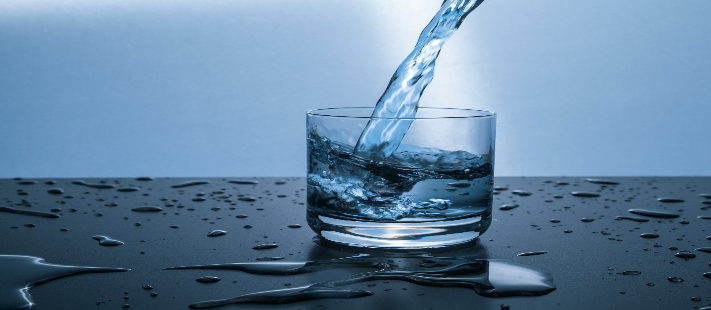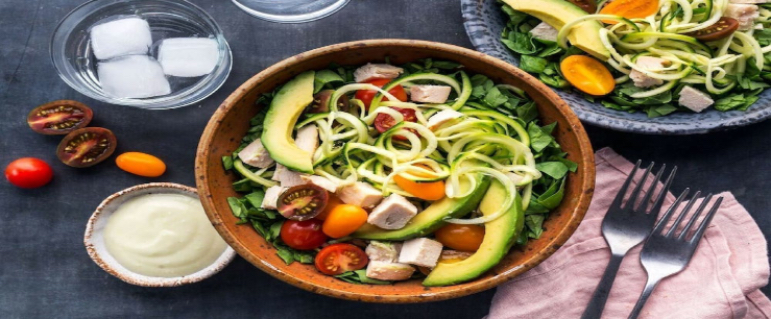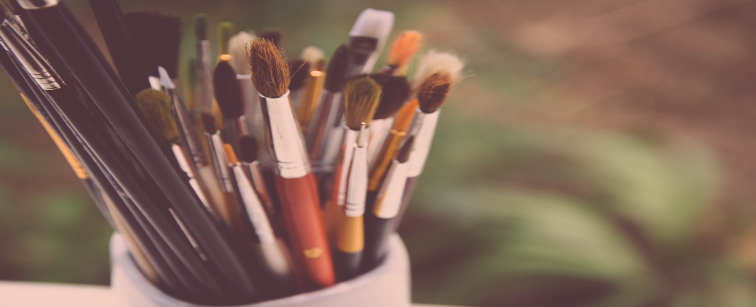Hydration For Active Adults
|Posted by Natania GoldbergDid you know adults 55+ are more likely to drink half the recommend 8 cups or more of water/day compared to younger adults?
Older adults are at an increased risk for dehydration, in part because they naturally have a lower water volume. Even minor illnesses can result in dehydration.
By raising awareness of good hydration, active aging professionals can avoid the negative effects of dehydration.
Good nutrition goes hand in hand with hydration, we can get both water and electrolytes from food. Food provides about 20% of the fluid in our bodies. Not getting enough fluid or electrolytes can cause dehydration.
THE IMPORTANT ROLES OF WATER
- Protects and cushions vital organs
- Moistens tissues such as those in the mouth, eyes, and nose
- Carries nutrients and oxygen throughout the body
- Prevents constipation
- Regulates body temperature
- Moistens air for breathing
- Maintains blood volume and blood pressure
- Lubricates and cushions joints and bones
- Helps kidneys remove waster; prevents kidney stone formation
- Helps digest and absorb nutrients; helps convert food to energy
SIGNS OF DEHYDRATION
- Lake of energy or feeling weak
- Dry mouth and/or chapped lips
- Feeling thirstier than normal
- Decreased urine output and/or dark urine
- Headaches, dizziness, or feeling lightheaded
- Constipation
HYDRATION TIPS
- Carry a bottle of water around with you
- Have water by your bed
- Check your urine color (it should not be dark)
- Drink a full glass of water when you take medications
- Flavor your water with fruit slices or herbs
- Drink water after going to the bathroom
- Dilute fruit juices with water
- Don’t limit water for convenience
To avoid dehydration, older adults should drink at least 8 cups of water per day. However, individual recommendations can vary. Always check with your doctor.
Chicken and Avocado Zucchini-Noodle Bowl
|Posted by Natania GoldbergA great way to use up that end of summer zucchini and eat a delicious low-carb, fiber-rich meal. Zucchini noodles, or zoodles, have become so popular that your grocery store probably sells them in the produce department. For this recipe, either purchase them or make your own with a spiralizer. Swapping zoodles for pasta noodles can save you up to 200 calories and 40 grams of carbs per cup!
Ingredients
- 1/2 cup (120ml) Greek yogurt
- 1 tablespoon olive oil
- 1 tablespoon honey
- 1 tablespoon fresh lemon juice
- 1 teaspoon wasabi paste
- 1/2 teaspoon salt
- 4 cups (100g) baby spinach, coarsely chopped
- 1 pound (450g) zucchini noodles, from 2 medium zucchinis
- 1 pound (450g) cooked chicken breasts, about 3 cups, cubed
- 16 grape tomatoes, halved
- 1 medium avocado, pitted and sliced
Directions
In a cup, stir the yogurt, olive oil, honey, lemon juice, wasabi and salt. Reserve.
Note: Wasabi paste varies in strength, so start with a teaspoon then taste the sauce, and add more if you can take the heat.
In each of four wide bowls, spread a cup of spinach, a heaping cup of zucchini noodles and top with 1/4 of the chicken, 4 halved grape tomatoes and 1/4 of the avocado. Drizzle with 2 heaping tablespoons of the yogurt mixture and serve.
Serves: 4 | Serving Size: about 3 cups/720ml
Nutrition (per serving): Calories: 261; Total Fat: 9g; Saturated Fat: 1g; Monounsaturated Fat: 6g; Cholesterol: 67mg; Sodium: 407mg; Carbohydrate: 15g; Dietary Fiber: 3g; Sugar: 6g; Protein: 29g
From My Fitness Pal
8 Brain-Boosting Hobbies Scientifically Proven to Help Keep You Sharp!
|Posted by Natania GoldbergYour brain is the command center of your body. From your feelings to behaviors, it dictates everything you do. Just like any other muscle, it’s important to stimulate and strengthen your brain. How do you train your brain to be stronger? Below are eight common hobbies scientifically proven to boost your brain’s health!
1) SPORTS & FITNESS
Physical activity is a powerhouse when boosting your brain! Breaking a sweat can improve your ability to multitask and increase productivity. On average, employees who exercise regularly are 15% more efficient and 23% more productive!
2) COMPUTER SKILLS
Mastering new computer skills can help keep your mind sharp. Researchers found that programmers have more activity in parts of the brain that are related to learning, speaking and understanding language.
3) YOGA & MEDITATION
Centering your chi greatly reduces stress and fights off anxiety. In a study, 60% of anxiety-prone participants showed improvement after 6-9 months of meditation.
4) COOKING & BAKING
Whipping up a tasty meal improves your ability to multitask. Multiple studies have shown that multitasking sparks brain activity and enhances neural efficiency.
5) MUSIC
Music exercises every part of the brain. Numerous studies have found that playing an instrument utilizes both hemispheres of the brain which strengthens brain functions and motor skills.
6) CRAFTS
Did you know that knitting and scrapbooking actually benefit your brain? Crafting may reduce chance of developing mild cognitive impairment by 30-50%
7) LANGUAGE
Learning a foreign language helps you stay mentally fit. Research has shown, that bilinguals show Alzheimer’s symptoms 5-6 years later than those who speak only one language.
8) ARTS
Channeling your inner Picasso can improve your problem-solving abilities and boost memory. Doodling while listening to information can lead to a 29% increase in memory recall.
Chances are you might already have a few of these hobbies. If so, give yourself a pat on the back and continue to sharpen your mind while doing something you enjoy. If not, it’s never too late to start something new!
Hydration For Active Adults
|Posted by Natania GoldbergDid you know adults 55+ are more likely to drink half the recommend 8 cups or more of water/day compared to younger adults?
Older adults are at an increased risk for dehydration, in part because they naturally have a lower water volume. Even minor illnesses can result in dehydration.
By raising awareness of good hydration, active aging professionals can avoid the negative effects of dehydration.
Good nutrition goes hand in hand with hydration, we can get both water and electrolytes from food. Food provides about 20% of the fluid in our bodies. Not getting enough fluid or electrolytes can cause dehydration.
THE IMPORTANT ROLES OF WATER
- Protects and cushions vital organs
- Moistens tissues such as those in the mouth, eyes, and nose
- Carries nutrients and oxygen throughout the body
- Prevents constipation
- Regulates body temperature
- Moistens air for breathing
- Maintains blood volume and blood pressure
- Lubricates and cushions joints and bones
- Helps kidneys remove waster; prevents kidney stone formation
- Helps digest and absorb nutrients; helps convert food to energy
SIGNS OF DEHYDRATION
- Lake of energy or feeling weak
- Dry mouth and/or chapped lips
- Feeling thirstier than normal
- Decreased urine output and/or dark urine
- Headaches, dizziness, or feeling lightheaded
- Constipation
HYDRATION TIPS
- Carry a bottle of water around with you
- Have water by your bed
- Check your urine color (it should not be dark)
- Drink a full glass of water when you take medications
- Flavor your water with fruit slices or herbs
- Drink water after going to the bathroom
- Dilute fruit juices with water
- Don’t limit water for convenience
To avoid dehydration, older adults should drink at least 8 cups of water per day. However, individual recommendations can vary. Always check with your doctor.
Chicken and Avocado Zucchini-Noodle Bowl
|Posted by Natania GoldbergA great way to use up that end of summer zucchini and eat a delicious low-carb, fiber-rich meal. Zucchini noodles, or zoodles, have become so popular that your grocery store probably sells them in the produce department. For this recipe, either purchase them or make your own with a spiralizer. Swapping zoodles for pasta noodles can save you up to 200 calories and 40 grams of carbs per cup!
Ingredients
- 1/2 cup (120ml) Greek yogurt
- 1 tablespoon olive oil
- 1 tablespoon honey
- 1 tablespoon fresh lemon juice
- 1 teaspoon wasabi paste
- 1/2 teaspoon salt
- 4 cups (100g) baby spinach, coarsely chopped
- 1 pound (450g) zucchini noodles, from 2 medium zucchinis
- 1 pound (450g) cooked chicken breasts, about 3 cups, cubed
- 16 grape tomatoes, halved
- 1 medium avocado, pitted and sliced
Directions
In a cup, stir the yogurt, olive oil, honey, lemon juice, wasabi and salt. Reserve.
Note: Wasabi paste varies in strength, so start with a teaspoon then taste the sauce, and add more if you can take the heat.
In each of four wide bowls, spread a cup of spinach, a heaping cup of zucchini noodles and top with 1/4 of the chicken, 4 halved grape tomatoes and 1/4 of the avocado. Drizzle with 2 heaping tablespoons of the yogurt mixture and serve.
Serves: 4 | Serving Size: about 3 cups/720ml
Nutrition (per serving): Calories: 261; Total Fat: 9g; Saturated Fat: 1g; Monounsaturated Fat: 6g; Cholesterol: 67mg; Sodium: 407mg; Carbohydrate: 15g; Dietary Fiber: 3g; Sugar: 6g; Protein: 29g
From My Fitness Pal
8 Brain-Boosting Hobbies Scientifically Proven to Help Keep You Sharp!
|Posted by Natania GoldbergYour brain is the command center of your body. From your feelings to behaviors, it dictates everything you do. Just like any other muscle, it’s important to stimulate and strengthen your brain. How do you train your brain to be stronger? Below are eight common hobbies scientifically proven to boost your brain’s health!
1) SPORTS & FITNESS
Physical activity is a powerhouse when boosting your brain! Breaking a sweat can improve your ability to multitask and increase productivity. On average, employees who exercise regularly are 15% more efficient and 23% more productive!
2) COMPUTER SKILLS
Mastering new computer skills can help keep your mind sharp. Researchers found that programmers have more activity in parts of the brain that are related to learning, speaking and understanding language.
3) YOGA & MEDITATION
Centering your chi greatly reduces stress and fights off anxiety. In a study, 60% of anxiety-prone participants showed improvement after 6-9 months of meditation.
4) COOKING & BAKING
Whipping up a tasty meal improves your ability to multitask. Multiple studies have shown that multitasking sparks brain activity and enhances neural efficiency.
5) MUSIC
Music exercises every part of the brain. Numerous studies have found that playing an instrument utilizes both hemispheres of the brain which strengthens brain functions and motor skills.
6) CRAFTS
Did you know that knitting and scrapbooking actually benefit your brain? Crafting may reduce chance of developing mild cognitive impairment by 30-50%
7) LANGUAGE
Learning a foreign language helps you stay mentally fit. Research has shown, that bilinguals show Alzheimer’s symptoms 5-6 years later than those who speak only one language.
8) ARTS
Channeling your inner Picasso can improve your problem-solving abilities and boost memory. Doodling while listening to information can lead to a 29% increase in memory recall.
Chances are you might already have a few of these hobbies. If so, give yourself a pat on the back and continue to sharpen your mind while doing something you enjoy. If not, it’s never too late to start something new!




ABS-Session!
|Posted by Natania GoldbergABS’ Session! For anyone that wants to tone their abs and strengthen core muscles. This 35 minute session encompasses various tempos, movements, ranges of motion and equipment. Great for any skill level to decrease waist line and tone lower and upper abdominals.
Read more >
A little of this, A little of that!
|Posted by Natania GoldbergSometimes you just need a little of this, a little of that! Hill work followed by flat sprints. Super set your leg strength work with speed power! Download the full playlist here
Read more >
Be True to You in Your Training Program!
|Posted by Natania GoldbergThe one size fits all approach to training and exercises has long been taken out of the books. When it comes to reaching your fitness and wellness goals it is important to be on an exercise program that is individualized not only for your goals, current level and experience but in addition, suits your personality […]
Read more >
Give It Your Best!
|Posted by Natania GoldbergGood, Better and your BEST effort! Take it to your max with each set during this 50 minute cycle class Playout! Download the Playlist here
Read more >
Ups and Downs
|Posted by Natania Goldberg“Life is full of ups and downs. The trick is to enjoy the ups and have courage during the downs.” Everything done up out of the saddle, is done in the saddle. Buckle up and enjoy the ride. Download the playlist here.
Read more >
The 30th Spinning Playout
|Posted by Natania Goldberg30 second intervals with 3.0 Hills! Download the full Playout Session Playlist here!
Read more >
“PLAYOUT” and Reach Your Fitness Goals!
|Posted by Natania GoldbergThroughout my years of being a personal trainer and Wellness Coach I have had several conversations with my clients that involved them telling me about one of their greatest “workouts” or bouts of exercise that they truly enjoyed.
Read more >
“Just Do You” Celebrate National Bikini Day on July 5th.
|Posted by Natania GoldbergIt’s that time of year again! And yes, there is a holiday dedicated to this time of year as well! Time to take that cover off and walk on the beach. Even the most bikini savvy women and the speedo stud of men, can find this annual fest an ordeal. This summer choose to have […]
Read more >
Here’s to your Independence this July 4th! Exercise, Your Fountain of Youth
|Posted by Natania GoldbergReduce your biological age and prolong your independence by starting and staying on a regular exercise program. Engaging in a consistent exercise program has been shown to assist with losing weight, decreasing body fat, lower stress and increasing energy but…reduce our biological age? Yes! This July 4th let’s celebrate our independence and find our fountain […]
Read more >
IMAGINE
|Posted by Natania GoldbergI just got back from Las Vegas where for my birthday I was treated to The Beatles LOVE, Cirque Du Soleil show featuring the music of The Beatles. As I watched the show with the utmost amazement and awe I began to think about the message we heard from one of the most famous Beatles […]
Read more >
Group Training
|Posted by Natania GoldbergMany experiences are nicer when they are shared with someone else. Meals, movies, laughs, exercise, shopping, sightseeing, and travel are just some of the experiences that are enhanced when shared between two or more people. Sharing experiences in a group many times broadens the scope of your own perceptions of experiences because you witness others reactions, […]
Read more >
Indented Quotes and Images – beautiful
|Posted by AdministratorLorem ipsum dolor sit amet, consectetuer adipiscing elit. Aenean commodo ligula eget dolor. Aenean massa. Cum sociis natoque penatibus et magnis dis parturient montes, nascetur ridiculus mus. Donec quam felis, ultricies nec, pellentesque eu, pretium quis, sem.
Read more >
New POST COMING SOON!
|Posted by AdministratorRead more >